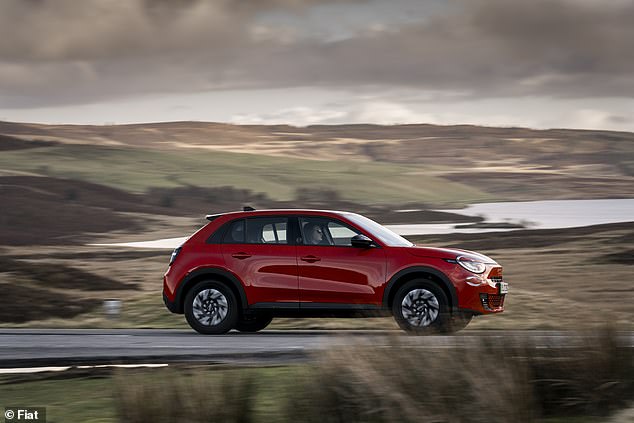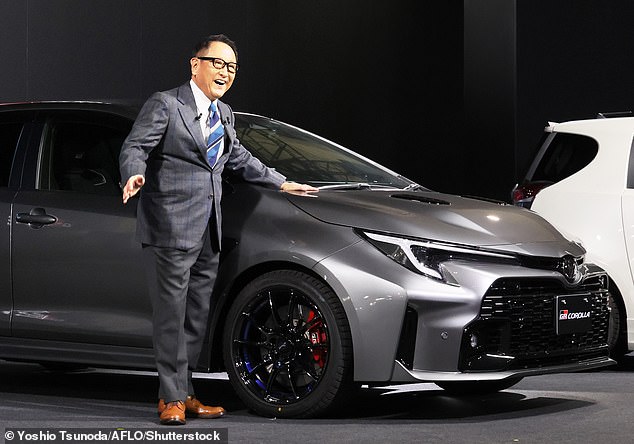Fiat launched a lower-cost hybrid version of its new electric family car as UK bosses warned that slowing demand for electric vehicles had forced them to act.
The Italian brand’s new self-charging 600 Hybrid costs up to £10,000 less than the equivalent all-electric 600e model, and eliminates the range and charging anxiety drivers face because there are so few public chargers.
Fiat UK said the move was necessary because consumer adoption of electric vehicles is not up to the levels demanded by politicians and ministers who “got off the bus too soon” by removing subsidies for electric vehicles.

Fiat’s change of plan: The Italian brand had originally planned to sell only the 600e electric crossover (pictured) in Britain, but made the last-minute decision to launch a hybrid version.
The shortage of public charging points, the reduction and then withdrawal of government subsidies for electric vehicles for customers and the cost of living crisis have contributed to a lack of consumer confidence, which in turn has affected the demand for electric cars from private buyers, despite politicians insisting that more electric cars must be sold.
In response, Italian car company executives say it’s time for a reality check and a wake-up call to ministers to do more to boost demand for electric vehicles.
Fiat had originally said it would offer only the electric 600e in the UK, but said that in light of slow sales of electric vehicles it had been forced to revise its plans and also introduce a 600 Hybrid.
It comes after carmakers, through trade body the Society of Motor Manufacturers and Traders (SMMT), urged Chancellor Jeremy Hunt to help boost sales of electric vehicles among private buyers by halving VAT. of the 20 percent that was imposed on them in the last budget on Wednesday before a general election.
While company car and fleet buyers enjoy lucrative tax incentives to switch to pure electric cars, private buyers have seen subsidies reduced and then withdrawn, and often cannot afford the latest electric vehicles.
The slow rollout of public chargers has exacerbated that lack of trust, say bosses who want the government to reinstate subsidies or reduce VAT on sales as an incentive to increase sales of electric vehicles.
The government insists that sales of petrol and diesel cars must end by 2035, and recently extended that deadline from 2030 following a successful campaign by the Daily Mail.
Fiat’s UK managing director Damien Dally said his company remained “100 per cent committed to electrification for the masses”, but in relation to ministers removing incentives, he added: “The government has stepped down from the bus too soon. We feel enormously disappointed.
“Retail customers buy cars with their own money and now they don’t buy electric cars in enough quantity.”
Fiat said the new ‘electrified’ 600 Hybrid will cost from £23,965 on-the-road with red as the standard color and a £600 add-on for other colors including orange, green, blue, stone black and white.
The range-topping 600 Hybrid La Prima will start at £26,965 with orange as standard and an extra £600 for green, blue and stone.
By contrast, the base pure-electric 600e Red starts at £32,995, while the higher-spec 600e La Prima costs from £36,995 with non-standard paints, also an extra £600 and an upgraded charging cable, a £400 option. .
That’s a difference of £10,030 from the price of the top-of-the-range La Prima electric and hybrid models.


Fiat’s UK managing director Damien Dally said his company remained “100 per cent committed to electrification for the masses”, but in relation to ministers removing incentives, he added: “The government has stepped down from the bus too soon. We were hugely disappointed.
Fiat said it would continue to offer its own £3,000 ‘e-grant’ contribution to customers who buy its pure electric vehicles, including the 600e, 500e, 500e convertible and the Abarth 500e, saying: “It is equivalent to double what was offered for the plan.” closed by the government in 2022.’
The Italian car company adds: “EV sales data suggests that the exponential growth of the vehicle segment is starting to slow down year on year.”
It said: ‘With the cost of living crisis in Britain in recent years there has been enormous financial upheaval.
“The market still needs incentives and Fiat has urged the UK government to reinstate its own scheme.”


Hybrid versions of the Fiat 600 will be around £10,000 cheaper than the all-electric 600e variants.
It is not only Fiat that is betting on hybrids
The latest overall UK sales figures show that while sales of electric cars have slowed, those of petrol-electric hybrids have soared.
Other automakers have also warned that market conditions mean they are slowing production of electric vehicles in favor of hybrids.
toyota has invested heavily in hybrids and president and former CEO Akio Toyoda believes electric vehicles will only make up 30 percent of the market.
“Customers, not regulations or politics, should make the decision about which path to rely on to reduce it,” he said.
A Financial Times report noted: “After spending the last decade as the auto industry’s loudest advocates of hybrid vehicles, Toyota executives could be forgiven for feeling some vindication.”


Electric cars will never dominate the car market, according to Akio Toyoda (pictured), president of the world’s second-largest car maker, Toyota.
Ford CEO Jim Farley told investors recently: “Hybrids will play an increasingly important role in our industry transition and will be here for the long term.”
Mercedes Benz revealed last month that it will delay its goal of becoming an all-electric vehicle brand by 2030 and will instead continue producing gasoline- and diesel-powered cars and hybrids well into the next decade.
The SMMT said the UK is now the only major market insisting on a ban on petrol and diesel by 2035 “without any meaningful consumer incentive to help drivers buy an electric car”.
He warned: “However, it is increasingly clear that private buyers need more support to change.”
Chief executive Mike Hawes said factors such as high energy prices, inflation and interest rates, anxiety over charging and “mixed messages from government” had restrained consumer demand for electric cars. consumers.
He highlighted: “Manufacturers have been asked to provide the vehicles, now we are calling on the government to help consumers buy the vehicles that net zero depends on.”
Hawes said: “Market growth is currently dependent on businesses and fleets. Therefore, the government should use the next budget to support private buyers of electric vehicles, temporarily halving VAT to reduce emissions. carbon, boost economic growth and help everyone make the switch.
Some links in this article may be affiliate links. If you click on them, we may earn a small commission. That helps us fund This Is Money and keep it free to use. We do not write articles to promote products. We do not allow any commercial relationship to affect our editorial independence.
